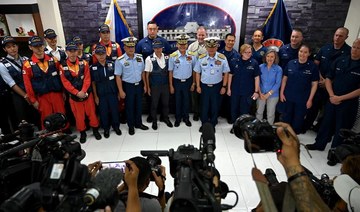BEIJING: China warned on Tuesday that Washington was “endangering regional peace” in a new deal with the Philippines that will see four additional bases be used by US troops, including one near the disputed South China Sea and another not far from Taiwan.
“Out of self-interest, the US maintains a zero-sum mentality and continues to strengthen its military deployment in the region,” foreign ministry spokeswoman Mao Ning said.
“The result will inevitably be increased military tension and endangering regional peace and stability,” she added.
Longtime treaty allies Manila and Washington agreed in February to expand cooperation in “strategic areas” of the Philippines as they seek to counter Beijing’s growing assertiveness over self-governed Taiwan and China’s construction of bases in the South China Sea.
The 2014 Enhanced Defense Cooperation Agreement, known as EDCA, gave US forces access to five Philippine bases.
It was later expanded to nine, but the locations of the four new bases were withheld until Monday while the government consulted with local officials.
The four sites had been assessed by the Philippine military and deemed “suitable and mutually beneficial,” the Presidential Communications Office said in a statement Monday.
The US Department of Defense confirmed that the locations announced were the four new EDCA sites.
It also said in a statement it would add to the “$82 million we have already allocated toward infrastructure investments at the existing EDCA sites,” without specifying by how much.
Three of the sites are in the northern Philippines, including a naval base and airport in Cagayan province and an army camp in the neighboring province of Isabela, Manila’s statement said.
The naval base at Cagayan’s Santa Ana is about 400 kilometers (250 miles) from Taiwan.
Another site will be an air base on Balabac Island, off the southern tip of Palawan Island, near the South China Sea.
Cagayan Governor Manuel Mamba has publicly opposed having EDCA sites in his province for fear of jeopardizing Chinese investment and becoming a target in a conflict over Taiwan.
But Philippine acting defense chief Carlito Galvez told reporters recently the government had already decided on the sites and that Mamba had agreed to “abide with the decision.”
The agreement allows US troops to rotate through the bases and also store defense equipment and supplies.
The United States has a long and complex history with the Philippines.
They share a decades-old mutual defense treaty, but the presence of US troops in the Southeast Asian country remains a sensitive issue.
The United States had two major military bases in the Philippines but they were closed in the early 1990s after growing nationalist sentiment.
US troops return to the Philippines every year for joint military exercises, including Balikatan, which kicks off next week. With more than 17,000 soldiers taking part, it will be the largest yet.
The pact stalled under former president Rodrigo Duterte, who favored China over the Philippines’ former colonial master.
But President Ferdinand Marcos, who succeeded Duterte in June, has adopted a more US-friendly foreign policy and has sought to accelerate the implementation of the EDCA.
Marcos has insisted he will not let Beijing trample on Manila’s maritime rights.
While the Philippine military is one of the weakest in Asia, the country’s proximity to Taiwan and its surrounding waters would make it a key partner for the United States in the event of a conflict with China.
China warns Philippines-US base deal ‘endangering regional peace’
https://arab.news/z8987
China warns Philippines-US base deal ‘endangering regional peace’

- ‘Out of self-interest, the US maintains a zero-sum mentality and continues to strengthen its military deployment in the region’
- The 2014 Enhanced Defense Cooperation Agreement gave US forces access to five Philippine bases
Poland slow to counter Russia’s ‘existential threat’: general

- The general highlighted a low “pace of technical modernization,” compared to increases in the army’s size
- Kukula said the Polish army should reach 500,000 soldiers by 2039
WARSAW: Russia poses an “existential threat” to Poland and its military is lagging, the country’s armed forces chief warned senior officials on Wednesday.
Poland, the largest country on NATO’s eastern flank and a neighbor of Russia, Belarus, and Ukraine, is the western alliance’s largest spender in relative terms.
This year, the country is allocating 4.8 percent of its GDP to defense, just shy of the alliance’s five percent target to be met by 2035.
However, that record defense spending was not enough to “make up for nearly three decades of chronic underfunding of the armed forces,” General Wieslaw Kukula, chief of the general staff, argued at the meeting, which included top officers, the defense minister and Poland’s president.
The general highlighted a low “pace of technical modernization,” compared to increases in the army’s size.
Kukula said the Polish army should reach 500,000 soldiers by 2039, compared with around 210,000 at present.
As a result of a lack of updates, some new Polish units “are not achieving combat readiness,” due to insufficient equipment, rather than a personnel shortage, the general argued.
Meanwhile, he added, “the Russian Federation remains an existential threat to Poland.”
Russia “is constantly reorganizing its forces, drawing on the lessons from its aggression in Ukraine, and building up the capacity for a conventional conflict with NATO countries,” he stressed.
Poland is to receive 43.7 billion euros ($51,5 billion) in loans under the European Union’s Security Action For Europe (SAFE) scheme, designed to strengthen Europe’s defensive capabilities.
Warsaw plans to use these funds to boost domestic arms production.
The Polish government claims that Poland will be able to access SAFE finance even if President Karol Nawrocki — backed by Poland’s conservative-nationalist opposition — vetos a law setting out domestic arrangements for its implementation.
Law and Justice (PiS) — the main opposition party — argues that SAFE could become a new tool for Brussels to place undue pressure on Poland, thanks to a planned mechanism for monitoring the funds, which they claim risks undermining Polish sovereignty.














